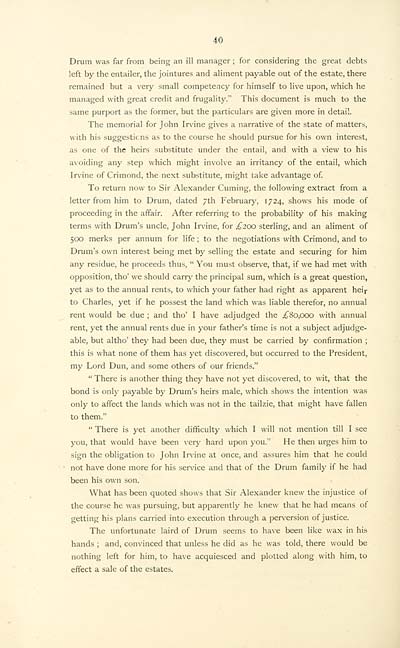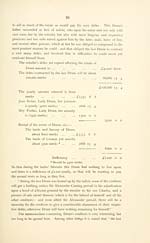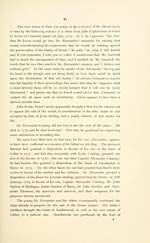Memorials of four old families
(322) Page 40
Download files
Complete book:
Individual page:
Thumbnail gallery: Grid view | List view

40
Drum was far from being an ill manager ; for considering the great debts
left by the entailer, the jointures and aliment payable out of the estate, there
remained but a very small competency for himself to live upon, which he
managed with great credit and frugality." This document is much to the
same purport as the former, but the particulars are given more in detail.
The memorial for John Irvine gives a narrative of the state of matters,
with his suggestions as to the course he should pursue for his own interest,
as one of the heirs substitute under the entail, and with a view to his
avoiding any step which might involve an irritancy of the entail, which
Irvine of Crimond, the next substitute, might take advantage of.
To return now to Sir Alexander Cuming, the following extract from a
letter from him to Drum, dated 7th February, 1724, shows his mode of
proceeding in the affair. After referring to the probability of his making
terms with Drum's uncle, John Irvine, for ^"200 sterling, and an aliment of
500 merks per annum for life ; to the negotiations with Crimond, and to
Drum's own interest being met by selling the estate and securing for him
any residue, he proceeds thus, " You must observe, that, if we had met with
opposition, tho' we should carry the principal sum, which is a great question,
yet as to the annual rents, to which your father had right as apparent hei r
to Charles, yet if he possest the land which was liable therefor, no annual
rent would be due ; and tho' I have adjudged the ^80,000 with annual
rent, yet the annual rents due in your father's time is not a subject adjudge-
able, but altho' they had been due, they must be carried by confirmation ;
this is what none of them has yet discovered, but occurred to the President,
my Lord Dun, and some others of our friends."
" There is another thing they have not yet discovered, to wit, that the
bond is only payable by Drum's heirs male, which shows the intention was
only to affect the lands which was not in the tailzie, that might have fallen
to them."
" There is yet another difficulty which I will not mention till I see
you, that would have been very hard upon you." He then urges him to
sign the obligation to John Irvine at once, and assures him that he could
not have done more for his service and that of the Drum family if he had
been his own son.
What has been quoted shows that Sir Alexander knew the injustice of
the course he was pursuing, but apparently he knew that he had means of
getting his plans carried into execution through a perversion of justice.
The unfortunate laird of Drum seems to have been like wax in his
hands ; and, convinced that unless he did as he was told, there would be
nothing left for him, to have acquiesced and plotted along with him, to
effect a sale of the estates.
Drum was far from being an ill manager ; for considering the great debts
left by the entailer, the jointures and aliment payable out of the estate, there
remained but a very small competency for himself to live upon, which he
managed with great credit and frugality." This document is much to the
same purport as the former, but the particulars are given more in detail.
The memorial for John Irvine gives a narrative of the state of matters,
with his suggestions as to the course he should pursue for his own interest,
as one of the heirs substitute under the entail, and with a view to his
avoiding any step which might involve an irritancy of the entail, which
Irvine of Crimond, the next substitute, might take advantage of.
To return now to Sir Alexander Cuming, the following extract from a
letter from him to Drum, dated 7th February, 1724, shows his mode of
proceeding in the affair. After referring to the probability of his making
terms with Drum's uncle, John Irvine, for ^"200 sterling, and an aliment of
500 merks per annum for life ; to the negotiations with Crimond, and to
Drum's own interest being met by selling the estate and securing for him
any residue, he proceeds thus, " You must observe, that, if we had met with
opposition, tho' we should carry the principal sum, which is a great question,
yet as to the annual rents, to which your father had right as apparent hei r
to Charles, yet if he possest the land which was liable therefor, no annual
rent would be due ; and tho' I have adjudged the ^80,000 with annual
rent, yet the annual rents due in your father's time is not a subject adjudge-
able, but altho' they had been due, they must be carried by confirmation ;
this is what none of them has yet discovered, but occurred to the President,
my Lord Dun, and some others of our friends."
" There is another thing they have not yet discovered, to wit, that the
bond is only payable by Drum's heirs male, which shows the intention was
only to affect the lands which was not in the tailzie, that might have fallen
to them."
" There is yet another difficulty which I will not mention till I see
you, that would have been very hard upon you." He then urges him to
sign the obligation to John Irvine at once, and assures him that he could
not have done more for his service and that of the Drum family if he had
been his own son.
What has been quoted shows that Sir Alexander knew the injustice of
the course he was pursuing, but apparently he knew that he had means of
getting his plans carried into execution through a perversion of justice.
The unfortunate laird of Drum seems to have been like wax in his
hands ; and, convinced that unless he did as he was told, there would be
nothing left for him, to have acquiesced and plotted along with him, to
effect a sale of the estates.
Set display mode to:
![]() Universal Viewer |
Universal Viewer | ![]() Mirador |
Large image | Transcription
Mirador |
Large image | Transcription
Images and transcriptions on this page, including medium image downloads, may be used under the Creative Commons Attribution 4.0 International Licence unless otherwise stated. ![]()
| Histories of Scottish families > Memorials of four old families > (322) Page 40 |
|---|
| Permanent URL | https://digital.nls.uk/95084794 |
|---|
| Description | A selection of almost 400 printed items relating to the history of Scottish families, mostly dating from the 19th and early 20th centuries. Includes memoirs, genealogies and clan histories, with a few produced by emigrant families. The earliest family history goes back to AD 916. |
|---|

